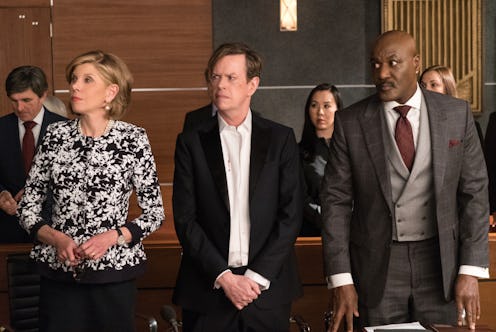Entertainment
'The Good Fight' Creators Know The Show Has A Race Problem

Throughout its seven-year run, CBS' The Good Wife won praise for its performances and handling of hot-button issues — but also its fair share of criticism for a lack of diversity among its ensemble cast. With the exception of Archie Panjabi, who's South Asian, and, later, Cush Jumbo, who's biracial, Wife was largely white, and so it's not surprising that when casting that series' spinoff, The Good Fight, creators Robert and Michelle King would try to rectify the problem. In the show, the white Diane joins a predominantly black law firm as a "diversity hire" — a self-aware nod to the criticism the Kings have rightfully experienced since The Good Wife's 2009 premiere.
"It might be a show having a 'kick me' sign on its back," says Robert with a laugh, speaking via phone a few days before Fight's Season 1 finale. "If you want to rip us apart, here’s the place to do it."
And it's true, that despite its setting and topics tackled — the law firm in Fight frequently takes on cases regarding police brutality and racial bias — the spinoff still features a primarily white leading cast, just like its predecessor. There's certainly more representation than in Wife, with Jumbo's Lucca and Erica Tazel's lawyer Barbara in major roles, but the problem that plagued the original show is still a significant issue with the spinoff. Yet the Kings say they "welcome" any criticism they might receive, both for the show's casting and its take on on race-related matters.
"The show criticized itself for that by having Barbara Volstead worry that the culture of the firm would be taken over by Diane bringing in a lot of white employees," Robert explains, adding, "The show is not a critique of racism with a capital R, it’s a critique of liberal racism — how people who think of themselves aligned as woke are often perpetrating and continuing to perpetrate some of the old biases without acknowledging it. There’s a deeper hypocrisy with that, when the racism is coming from the world of being liberal. And I think that’s what the show’s about, and I think to explore that, you need white people in it."
Robert adds that he believes Diane's choice to bring along her white former co-workers to her new, mostly-black firm, is reflective of actual life.
"I think it’s a way to address the show if it were reality," he says. "If you did have Diane Lockhart coming into a firm, would she bring someone over from the old Lockhart Gardner offices? She probably would’ve, and that person would probably be white. And would that create a conflict within the firm?"
In the world of The Good Fight, the answer is yes — it just so happens that that conflict extends to the show's off-screen reception, too.